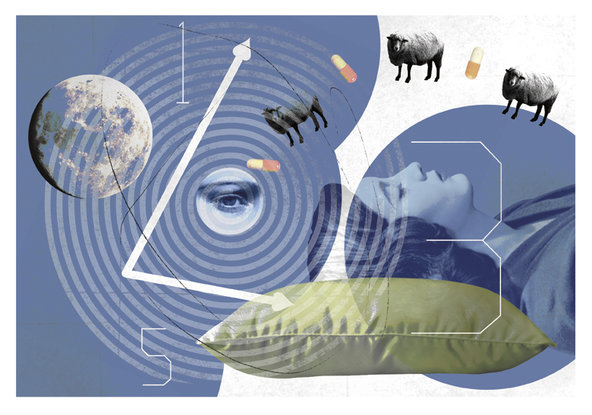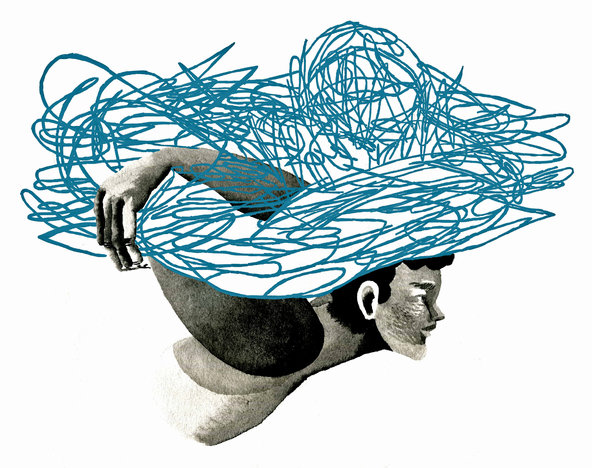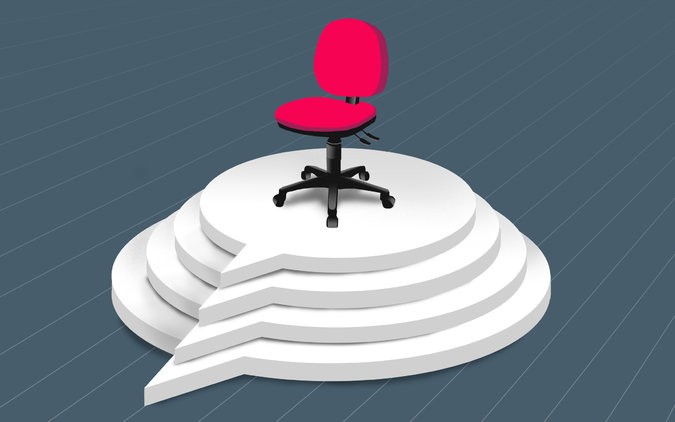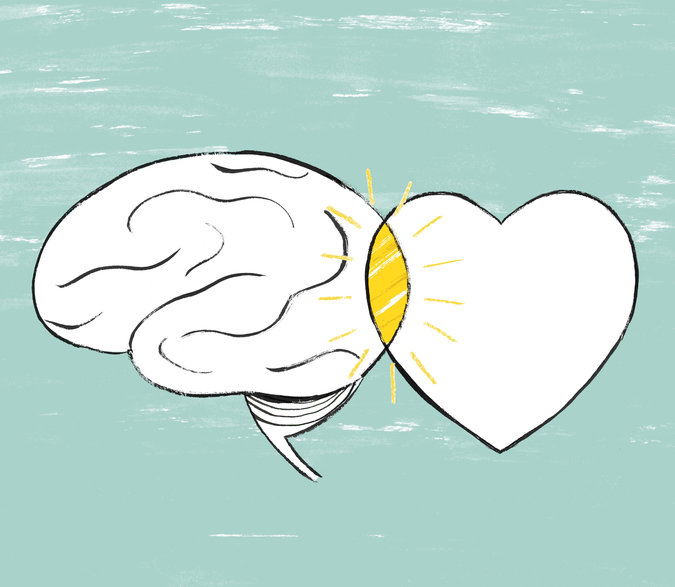How to Reclaim Your Weekend A new book explains how we lost our work-life balance, why it matters, and what to do about it. It’s funny how my weekends no longer feel like weekends of yore. Instead of spending time in play, exercise, or community pursuits, often as not I end up catching up on work, answering emails, or doing …
Tweaking the gut microbiome may hold promise for fighting stress, anxiety
Each night before “Greg” goes to bed he brushes and flosses his teeth. Then he double-checks the instructions on the dark brown bottle his nurse gave him before he unscrews the cap and tips five drops of a light-amber, oily liquid onto a spoon. The brew, glistening from the light of the bathroom fixture, is tasteless and has no odor …
Sleep may help us to forget by rebalancing brain synapses
New research provides evidence for the idea that sleep restores cellular homeostasis in the brain and helps us to forget irrelevant information. We spend one third of our lives sleeping, but we still do not know exactly why we sleep. Recent research shows that that the brain does its housekeeping while we sleep, and clears away its waste. According to …
Turning Negative Thinkers Into Positive Ones
Most mornings as I leave the Y after my swim and shower, I cross paths with a coterie of toddlers entering with their caregivers for a kid-oriented activity. I can’t resist saying hello, requesting a high-five, and wishing them a fun time. I leave the Y grinning from ear to ear, uplifted not just by my own workout but even …
What I Learned From a Stroke at 26: Make Time to Untangle
As an idealistic, knowledge-hungry college graduate and aspiring writer, I had grown tired of hopping from one office gig to the next. It was 2000 and technology was in full bloom. I wanted to cash in on the digital gold rush. Like many of my friends in Austin, Tex., I figured, why not join the internet economy? I answered an …
How Silicon Valley Can Help You Get Unstuck
At one time or another, many of us feel stuck: in the wrong job, the wrong relationship, the wrong city – the wrong life. Christine Metzger felt that way. After a decade of working in education administration, she woke up one day and realized she wasn’t the person she wanted to be. Christine found what seemed like just the change …
Just a few weeks of therapy is associated with significant and long-lasting changes
Imagine the arrival of some high-tech brain device for treating mental health problems. It’s effective for many, but there’s an important side-effect. It changes your personality. Alarm ensues as campaigners warn that users risk being altered fundamentally for years to come. Now replay this scenario but replace the neuro-gizmo with good old-fashioned psychotherapy, and realise this: we’re talking fact, not …
A kinder, gentler philosophy of success
Alain de Botton examines our ideas of success and failure — and questions the assumptions underlying these two judgments. Is success always earned? Is failure? He makes an eloquent, witty case to move beyond snobbery to find true pleasure in our work. To see his Ted Talk, click here.
How Exercise Might Keep Depression at Bay
Exercise may be an effective treatment for depression and might even help prevent us from becoming depressed in the first place, according to three timely new studies. The studies pool outcomes from past research involving more than a million men and women and, taken together, strongly suggest that regular exercise alters our bodies and brains in ways that make us …
Lots Of Other Countries Mandate Paid Leave. Why Not The U.S.?
If you’ve been paying attention to the political news in the past couple of years, you know that the U.S. stands virtually alone in not mandating paid leave of any type for its workers. It’s hard to miss; the topic has become a top talking point for Democratic politicians. Hillary Clinton is advocating for stronger paid-leave policies on the campaign …
The Art of Condolence
Offering a written expression of condolence (from the Latin word condolere, to grieve or to suffer with someone) used to be a staple of polite society. “A letter of condolence may be abrupt, badly constructed, ungrammatical — never mind,” advised the 1960 edition of Emily Post. “Grace of expression counts for nothing; sincerity alone is of value.” But these days, …
The End of Reflection
There are many moments throughout my average day that, lacking print reading material in a previous era, were once occupied by thinking or observing my surroundings: walking or waiting somewhere, riding the subway, lying in bed unable to sleep or before mustering the energy to get up. Now, though, I often find myself in these situations picking up my phone …
Life With A New Frame of Reference
We all carry in our heads invisible frames of reference that filter our experience and shape the way we see the world around us. Those frames are the product of many things — our cultural experience, our assumptions, but also our biology and the way the biology of our particular mind focuses our attention in the world. To read more …
Is Your Personality Fixed, Or Can You Change Who You Are?
This is the story of a prisoner who committed a horrible crime and says he’s no longer the same person who did it. It’s also the story of why it’s so hard for us to believe him. In the early 1960s, a young psychologist at Harvard University was assigned to teach a class on personality. Though Walter Mischel was excited …
Where Does the Time Go? How to Keep Track
How busy are we, exactly? The author and time management expert Laura Vanderkam decided to answer that question for herself. She tracked her time for an entire year (8,784 hours in a leap year), and in doing so learned her life was a bit less hectic than she thought. Ms. Vanderkam, a working mother of four young children, recently wrote …
Parents With Sleep Problems Think Their Children Have Them, Too
If you tell your child’s pediatrician that your child is having trouble sleeping, she might respond by asking you how well you sleep yourself. A team of Finnish researchers found that parents with poor sleep quality tended to report more sleep-related difficulties in their children than parents who slept well. But when the researchers looked at an objective monitor of …
The Secrets to a Happy Life, From a Harvard Study
What does it take to live a good life? Surveys show that most young adults believe that obtaining wealth and fame are keys to a happy life. But a long-running study out of Harvard suggests that one of the most important predictors of whether you age well and live a long and happy life is not the amount of money …
Doctors are reaching past the symptoms of mental illness to fix the circuits that breed them
She relaxed in the recliner, her eyes closed, her hands resting lightly in her lap. The psychiatrist’s assistant made small talk while pushing the woman’s hair this way and that, dabbing her head with spots of paste before attaching the 19 electrodes to her scalp. The frontier in mental illness treatment: In the struggle over the future of psychiatry, researchers …
Why We Think We’re Better Investors Than We Are
From their earliest days, the loosely confederated research efforts that came to be known as behavioral economics spawned a large quantity of studies centered on securities investment. This was not because the field’s pioneers were especially interested in stocks and bonds, nor was the early research commonly underwritten by financial services firms. Rather, the hive of activity that evolved into …
He Rescued A Dog. Then The Dog Rescued Him
Eric O’Grey knew he was in trouble. His weight had ballooned to 320 pounds, and he was spending more than $1,000 a month on medications for high blood pressure, Type 2 diabetes and high cholesterol. In 2010, a physician told him to buy a funeral plot, because he would need it in five years. He was 51 years old. So …
Silicon Valley Disrupts Education
A new style of learning, AltSchool’s ethos is fundamentally opposed to the paradigm of standardization that has dominated public education in recent decades, and reflects a growing shift in emphasis among theorists toward “personalized learning.” This approach acknowledges and adapts to the differences among students: their abilities, their interests, their cultural backgrounds. To read more from Rebecca Mead, click here.
Opening Up About Depression
I have slogged through a number of difficult situations in recent months, among them the ongoing crises of my elderly parents’ illnesses and the suicide of a friend. I never lost my appetite nor burst into tears, and I didn’t suffer from any of the other typical symptoms of depression. Maybe I was more irritable than usual, a bit more …
Watching Paint Dissappear in Water
This post has nothing whatsoever to do with being a Psychologist in Palo Alto, CA. But these beautiful images made me stop and pause, so I am simply sharing. A little moment of beauty and wonder never hurts! Read more on: THE EXTRAORDINARY UNDERWATER WORLD OF KIM KEEVER
Why Sound Matters
The spaces we design and inhabit all have distinctive sounds. Often the sound of a place is so pervasive that we stop noticing what we hear. Or we think the sound could not be otherwise — that is, until we, say, turn off the buzzing overhead lights. This article made me stop and think, as I recently sound – proofed …
Donald Winnicott & His Approach
Donald Winnicott deserves his place in history because of the dramatic simplicity of his approach. He proposed that the happiness and future satisfaction of the human race depended ultimately not so much on external political issues, but on something far closer to home: the way parents bring up their children. All the sicknesses of humanity were, in his view, in …
Work: When people find it productive and enjoyable
When it comes to landing a good job, many people focus on the role. Although finding the right title, position and salary is important, there’s another consideration that matters just as much: culture. The culture of a workplace — an organization’s values, norms and practices — has a huge impact on our happiness and success. Click here to read more.
What is Obsessive-Compulsive Disorder (OCD)?
Everyone double checks things sometimes. For example, you might double check to make sure the stove or iron is turned off before leaving the house. But people with obsessive-compulsive disorder (OCD) feel the need to check things repeatedly, or have certain thoughts or perform routines and rituals over and over. The thoughts and rituals associated with OCD cause distress and …
Why do we give? Many motives drive kind actions
Emotions reinforce kindness. Over a century of behavioral research demonstrates that people repeat actions that have rewarded them in the past. Giving also expresses our values and binds our communities. If we leave room for more everyday, instinctive forms of kindness, we’re actually doing ourselves a favor, too. To read more on this article by Jamil Zaki, click here.
Addicted to Distraction
According to one recent survey, the average white-collar worker spends about six hours a day on email. That doesn’t count time online spent shopping, searching or keeping up with social media. The brain’s craving for novelty, constant stimulation and immediate gratification creates something called a “compulsion loop.” Like lab rats and drug addicts, we need more and more to get …
For many people, gratitude is difficult, because life is difficult
Evidence suggests that we can actively choose to practice gratitude — and that doing so raises our happiness. Building the best life does not require fealty to feelings in the name of authenticity, but rather rebelling against negative impulses and acting right even when we don’t feel like it. In a nutshell, acting grateful can actually make you grateful. Make …


























